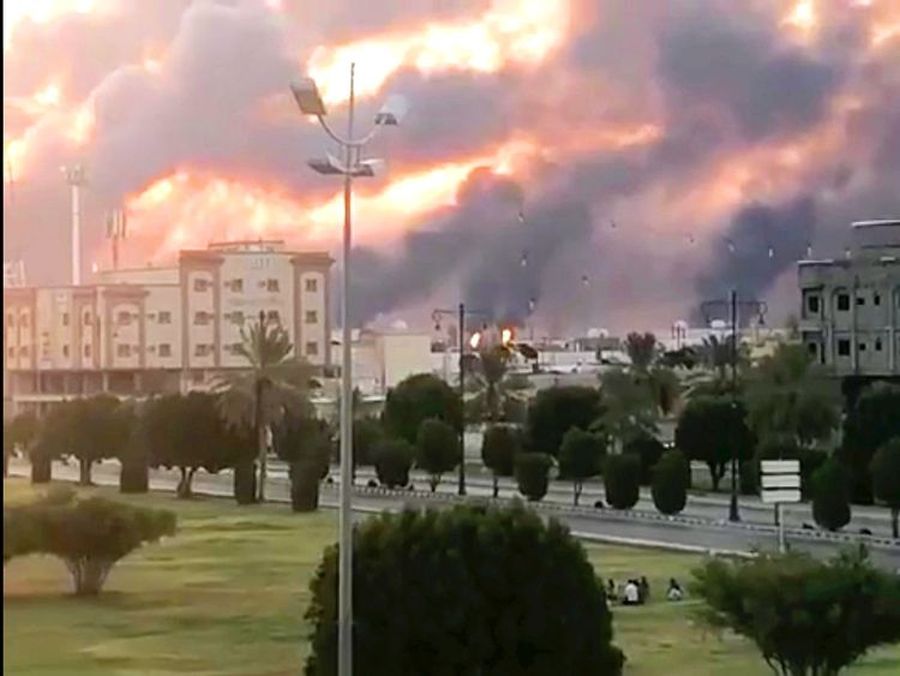
Mehran Kamrava. Troubled Waters. Insecurity in the Persian Gulf.
(Ithaca, NY: Cornell University Press, 2018)
The 14 September 2019 drone attacks on oil installations in eastern Saudi Arabia have dimmed hope for U.S. – Iranian discussions aimed to reduce tensions and potentially end the armed conflict in Yemen. Tensions have increased, and oil prices have risen. Certain hopes created by the initiatives of the French President during the G7 meeting in Biarritz, France and the forced departure of John Bolton as U.S. National Security Advisor have lessened. In fact, the aim of the attacks may have been to lessen the possibility of Iran – U.S. discussions which might have taken place during the start of the U.N. General Assembly in New York later in September.Today, the Persian Gulf remains one of the most heavily militarized and insecure regions of the world.
There is a good deal of speculation as to who fired the drones and from where. The Ansar Allah Movement (often called the Houthis) has taken credit, but some specialists doubt that they have the technical knowhow to send drones from Yemen to the targets in Saudi Arabia. Some speculate that the drones were sent from southern Iraq, possibly by Iranian-backed militias such as the Popular Mobilization Forces or by units of the Iranian Revolutionary Guards stationed in Iraq. The Revolutionary Guards are nearly “a state within the state” and could take initiatives without orders from the Iranian President or the Foreign Minister. The Revolutionary Guards could have motivations to prevent fruitful U.S. – Iranian talks at the U.N. There is also speculation that the drone attacks could be linked to increased tensions between Saudi Arabia and the United Arab Emirates concerning the future of south Yemen where the two countries support different factions.
Whatever the locations from which the drones were launched and whomever pulled the switch, the consequences are clear. At a time when governments were speaking of a possible path to reduce tensions a “No Exit” sign has been put up near the start of the road. The road leads to ever-greater tensions which may slip out of the control of governments.
As Kamrava points out beyond the armed conflict aspects of security “a broadened conception of security needs to take into account feelings of socil and economic unease produced by demographic imbalances and the dizzying pace of socioeconomic transition…This is an insecurity with multiple causes and dimensions, unlikely to be remedied by quick fixes or more militarization. It requires sustained attentio n… and perhaps more than anything else, diplomacy and dialogue. These two necessary ingredients, diplomacy and dialogue are what the Persian Gulf is currently missing the most.” However, in addition to the French proposal at the G7, there was an earlier Russian Government proposal.
On 23 July 2019, the Russian Government’s “Collective Security for the Persian Gulf Region” was presented in Moscow by the Deputy Foreign Minister, Mikhail Bogdanov. The Russian proposal for Collective Security for the Persian Gulf follows closely the procedures which led to the 1975 Helsinki Final Act and the creation of the Conference on Security and Cooperation in Europe. Bogdanov stressed multilateral ism as a mechanism for all involved in the assessment of situations, the decision-making process, and the implementation of decisions.
It is not clear how the Russian proposal for a Helsinki-type conference will progress. Russia does not play a leading role in the Middle East today as the USSR did in Europe in the 1970s. In the lead up to the Helsinki Accords of 1975, non-governmental organizations had played an active role in informal East-West discussions to see what issues were open to negotiations and on what issues progress might be made. There is a need for such non-governmental efforts today as the Persian Gulf and the wider Middle East are growing ever-more tense. Mehran Kamrava has written a good overview of the issues and the actors involved. Now action is needed
Rene Wadlow, President, Association of World Citizens
SIGN UP FOR COUNTERCURRENTS DAILY NEWS LETTER










































